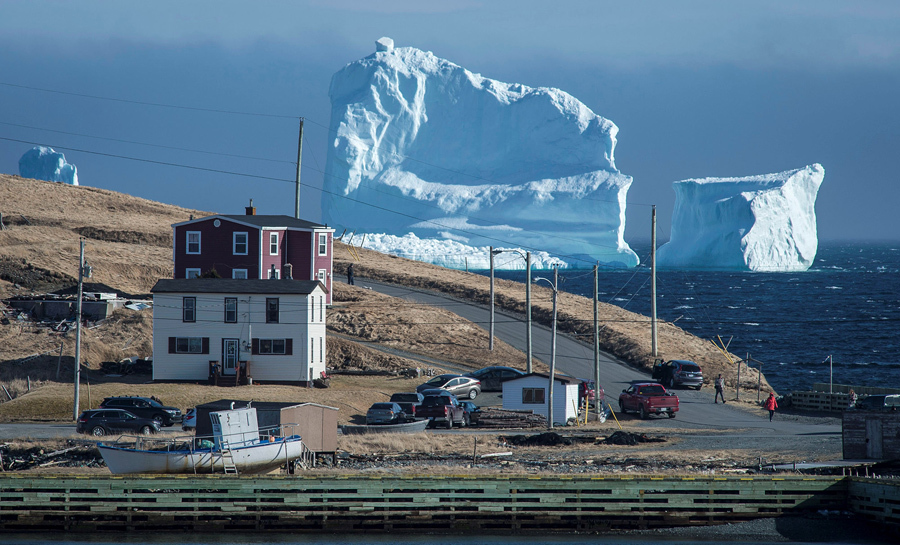The Daily Escape:

Iceberg floating near Ferryland Newfoundland, April 2017 – photo by Greg Locke
The Intercept has an interview of Kim Phillips-Fein by Naomi Klein about how Donald Trump made his first big deal during the New York City financial crisis of the mid-1970s. Phillips-Fein’s book is “Fear City”, which describes the NYC fiscal crisis of the 1970s that brought it to the verge of bankruptcy. The WSJ reports:
By June 1975, New York faced default on $4.5 billion in outstanding short-term debt owed to a few big banks and to thousands of unidentifiable small investors. Not only did the city have no way to repay $4.5 billion, it could not meet its routine, daily operating expenses, including payroll.
The WSJ says that between 1970 and 1980, more than 823,000 city dwellers left for (literally) greener pastures.
Ultimately the city did not go bankrupt. The banks and the city’s unions were willing to buy enough of the city’s (otherwise unsalable) debt to avoid bankruptcy. Important to the mix was the creation of the Municipal Assistance Corporation (MAC) run by Felix Rohatyn, who became chief negotiator between the city, its labor unions and its creditors. A new type of agency, The New York State Financial Control Board, that controlled the city’s budget, became the model for the type of emergency city managers that we saw last year in Flint and Detroit Michigan.
The NYC financial crisis helped Donald Trump emerge as a New York deal-maker. Trump convinced New York to let him take over the Commodore Hotel, which we now call the Grand Hyatt, just east of Grand Central station. Trump modernized and renovated it, it was his first construction project in Manhattan. Phillips-Fein picks up the story:
…the Commodore Hotel was a previously very fancy hotel from the early 20th century. I think it opens in 1919 at 42nd Street and Lexington Avenue. And it’s owned by the Penn Central Railroad. And the hotel kind of falls into disrepair and near collapse after Penn Central itself goes bankrupt in 1970.
The Commodore had stopped paying city property taxes and was for sale. The city was terrified that if the Commodore Hotel closed, the blight in Times Square would spread east, into the area around Grand Central Terminal. Trump saw an opportunity, while the city government saw a potential disaster. Together they hatched a plan for Trump to purchase the Commodore Hotel: (parenthesis by the Wrongologist)
What he actually wants to do is buy it and sell it to a state agency, the Urban Development Corporation (UDC)…And then the UDC will lease it back to Trump, [who was] working with the Hyatt organization.
The UDC leased it back to Trump and Hyatt. And this arrangement enabled them to pay substantially lower property taxes than usual. Phillips-Fein:
The New York Times reported that as of 2016, this tax arrangement with the Hyatt had cost New York City about $360 million in uncollected taxes in the years since the development.
Naomi Klein:
So I just want to pause there, because what you’re saying is…Trump and the Hyatt put down $9.5 million…They come up with this…sweetheart deal, a tax dodge. And that $9.5 million outlay translates back into roughly $360 million in tax savings…
The Trump/Hyatt tax deal set the stage for a wholesale change in the city. The fear of bankruptcy was central to understanding NYC politics at that moment: They feared an apocalyptic future. That fear created a need for a savior, and it found two in Donald Trump and Felix Rohatyn.
The NYC government decided that working with the business community was the bail-out it needed. It set the stage for the city’s luxury developments, for using different kinds of tax breaks that stimulated the development of properties primarily dedicated to the needs of corporations and the rich. It set the stage for a wholesale change in city politics from New Dealism to Neoliberalism. And it set the stage for Trump’s political career. Phillips-Fein: (brackets by the Wrongologist)
…you can see the straight line, really, from the Commodore to this skating rink [Wollman Rink in Central Park] to the presidential bid…”I’m not a politician. Washington is corrupt. I know how to do this better…”
Fear makes things that should be impossible suddenly feel as though they’re the only answer. Klein concludes by saying we should be very wary of the political exploitation of our fears, of political exploitation of an atmosphere of crisis.
It is clear that Donald Trump’s career and his fortune were really forged by doing just that.
